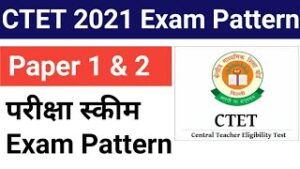CTET Syllabus 2024
CTET syllabus 2024 is prescribed by the exam organising body which is the Central Board of Secondary Education (CBSE). The exam is held annually twice a year in offline mode, i.e. pen and paper mode. CBSE will be organising the 18th edition of the CTET 2024 exam on 21st January 2024. Hence, all the candidates who will be appearing for the exam must be familiar with the latest CTET syllabus that has been discussed here.
No changes have been made in the CTET syllabus this year. CTET syllabus consists of two papers, paper 1 and paper 2. Paper 1 is attempted by those candidates who wish to teach Classes 1 to 5 while Paper 2 is attempted by those who plan on teaching the students of Classes 6 to 8. No change has been observed in the CTET syllabus 2024. The CTET syllabus includes the following topics:
- Child Development & Pedagogy
- Environmental Studies
- Mathematics
- Social Studies
- Science
- Language I
- Language II
The CTET syllabus for Paper 1 and 2 have common subjects, hence, the syllabus remains the same. However, in CTET syllabus for Paper 2, the candidates are given a choice to opt for either Mathematics and Science or Social Studies subject. Get the detailed CTET syllabus for each subject here.

CTET Syllabus 2024 Overview
The CTET exam is held in offline mode where multiple choice questions are asked. The exam is held in 20 languages for both Paper 1 and Paper 2. Each paper is for 2.5 hours. Every question is for 1 mark while there is no negative marking for an incorrect question attempted by the candidates. Before we get to discuss the CTET syllabus, let us give you a brief overview of the CTET syllabus in the table below.
| CTET Syllabus 2024 – Highlights | |
| Organisation | Central Board of Secondary Education (CBSE) |
| Name of Examination | CTET 2024 Exam |
| CTET Exam Date | 21st January 2024 (Sunday) |
| No. of papers in CTET | Two papers, Paper 1 and Paper 2 |
| CTET Exam Duration | 2.5 hours (for each paper) |
| Total languages in which the exam is held | 20 languages |
| Maximum Marks | 150 marks (for each paper) |
| Type of questions asked | Multiple Choice Questions |
| Mode of Exam | Offline (OMR Based) |
| Marking Scheme | 1 mark for each correct answer |
| Negative Marking | No negative marking for wrong answers |
CTET Syllabus 2024 PDF Download
The candidates who will be appearing for the CTET exam can download the CTET syllabus PDF for Paper 1 and Paper 2. By having the CTET syllabus PDF in Hindi and English one can check the list of the important topics that are asked in the exam at any given time. We have shared the latest CTET syllabus 2024 PDF below here.
Exam Pattern 2024 for Paper 1
CTET syllabus for Paper 1 is for those who are aiming to teach the students of classes 1 to 5. The subjects that are included in the CTET Paper 1 syllabus are Child Development and Pedagogy, Language – I, Language – II, Mathematics and Environmental Studies. Each paper is worth 30 marks, thereby, making the exam for a total of 150 marks. Practicing CTET question paper gives you a good knowledge of the CTET exam pattern. The subject wise syllabus for CTET paper 1 is given below in the table.
| CTET Exam Pattern for Paper 1 | ||
| CTET Subjects | Number of Questions in CTET Paper 1 | Marks |
| Child Development and Pedagogy | 30 | 30 |
| Language – I | 30 | 30 |
| Language – II | 30 | 30 |
| Mathematics | 30 | 30 |
| Environmental Studies | 30 | 30 |
| Total | 150 | 150 |
CTET Exam Pattern 2024 for Paper 2
There are five subjects in CTET Paper 2. The subjects that are covered in CTET Paper 2 are Child Development and Pedagogy, Language-I, Language-II, Mathematics and Science or Social Studies/Social Sciences. Candidates have the choice to opt any one subject from Mathematics and Science or Social Studies/Social Science. Each paper is for 30 marks having 30 questions. Thus, the CTET Paper 2 is for a total of 150 marks. Check the details for CTET exam pattern for paper 2 below in the table.
| CTET Paper 2 Exam Pattern | ||
| CTET Subjects | Number of Questions in CTET Paper 2 | Marks |
| Child Development & Pedagogy (compulsory) | 30 | 30 |
| Language-I (compulsory) | 30 | 30 |
| Language-II (compulsory) | 30 | 30 |
| Mathematics and Science (for Mathematics and Science teacher) OR Social Studies/Social Science (for Social Studies/Social Science teacher) OR Mathematics, Science and Social Studies/Social Science (for teacher of any other subject) | 60 | 60 |
| Total | 150 | 150 |
CTET Syllabus: Child Development & Pedagogy Syllabus
Child Development and Pedagogy are two of the CTET’s important topics that are covered in the CTET syllabus for both Paper 1 and Paper 2. This section will have the following given topics:
- Child Development (Primary School Child)
- Concept of Inclusive Education and Understanding Children with Special Needs
- Learning and Pedagogy
The CTET Child Development and Pedagogy syllabus aims to concentrate on the educational psychology of teaching and learning for children aged 6 to 13 years. Check the topic-wise syllabus below.
CTET Syllabus for Child Development and Pedagogy | ||
| Topics | Detailed Syllabus | Number of Questions |
| Child Development (Primary School Child) |
| 15 |
| Concept of Inclusive education and understanding children with special needs |
| 5 |
| Learning and Pedagogy |
| 10 |
CTET Syllabus: Language 1 Syllabus
CTET syllabus for Language 1 focuses on proficiency with the teaching medium. The language section I of CTET syllabus focuses on proficiency with the teaching medium. This section is considered to be the most scoring section, therefore, candidates will need to do a careful planning to able to achieve the target. The detailed CTET Language 1 syllabus is given in the table below.
| CTET Language 1 Syllabus | ||
| Topics | Detailed Syllabus | Number of Questions |
| Language Comprehension |
| 15 |
| Pedagogy of Language Development |
| 15 |
CTET Language 2 Syllabus
CTET Language 2 syllabus focus on language and comprehension skills. This section has 30 questions for 30 marks. Each section The detailed CTET Language 2 syllabus is given in the table below.
| CTET Language 2 Syllabus | ||
| Topics | Detailed Syllabus | Number of Questions |
| Comprehension |
| 15 |
| Pedagogy of Language Development |
| 15 |
CTET Maths Syllabus
The subjects that are covered in CTET Maths syllabus are class 10th based. Candidates should know the fundamentals of Mathematics that will help them solve the paper quickly and with maximum accuracy. The Maths section consists of 30 questions for 30 marks. The detailed CTET Maths syllabus is given in the table below.
| Topics | Detailed Syllabus | Number of Questions |
| Content |
| 20 |
| Pedagogical issues |
| 10 |
CTET Syllabus: CTET EVS Syllabus
Environment Studies is a part of the CTET syllabus. It focuses on the student’s pedagogical knowledge and problem solving skills. The CTET EVS syllabus has a total of 30 questions for 30 marks. Check the detailed syllabus in the table below.
| Topics | Detailed Syllabus | Number of Questions |
| Content |
| 15 |
| Pedagogical Issues |
| 15 |
CTET Science Syllabus
Candidates who opt to appear for the CTET exam for Science will have to study Physics, Chemistry and Biology based on Class 10h level. Questions will be basic general science-based that any candidate can attempt without much emphasis on it. Check the details CTET Science syllabus in the table below.
| CTET Syllabus for Science | ||
| Topics | Detailed Syllabus | Number of Questions |
| Content |
| 20 |
| Pedagogical issues |
| 10 |
CTET Syllabus for Social Science
The Social Science syllabus has subjects that cover History, Geography and Political Science. The syllabus also covers pedagogical concerns as well. Candidates should have a good grasp over the important days and dates in History, maps, constitution, the Preamble, etc. Check the detailed CTET Social Science Syllabus below in the table.
Eligibility (CTET) January 2024 | ||||
|---|---|---|---|---|
प्राथमिक चरण (कक्षा I से V)
| ||||
माध्यमिक चरण (कक्षा VI से VIII)
| ||||
IMPORTANT LINKS | ||||
Apply Online | Click Here | |||
Download Short Notification | Click Here | |||
Download Notification | Click Here | |||
Join Telegram | Click Here | |||
Download Notification Bulletin | Click Here | |||
Official Website | Click Here | |||
CTET Exam Pattern for Paper 1
Candidates who appear for CTET Paper 1 have a total of 5 sections. CTET Paper 1 exam pattern consists of a total of 150 multiple choice questions (MCQs). There is no negative marking for incorrect answers marked by the candidate. Hence, candidates should make sure that they attempt all the questions in the exam. The time duration for completion of the exam is 2 Hours 30 Minutes. Check the following table to know the CTET exam pattern for Paper 1.
| CTET Exam Pattern for Paper 1 | |||
| Subjects | Total Number of Questions | Total Number of Marks | Duration |
| Child Development and Pedagogy | 30 | 30 | 2.5 hours |
| Language I (compulsory) | 30 | 30 | |
| Language II (compulsory) | 30 | 30 | |
| Mathematics | 30 | 30 | |
| Environmental Studies | 30 | 30 | |
| Total | 150 | 150 | |
CTET Exam Pattern for Paper 2
CTET Paper 2 varies slightly from Paper 1. The CTET Paper 2 exam pattern consists of a total of four sections. Candidates have the option to select between Mathematics and Science and Social Studies to become teacher of a particular subject. The number of questions in this paper is 150. Further, there is no negative marking in this paper as well. Check the table below to know the CTET exam pattern for Paper 2.
| CTET Exam Pattern for Paper 2 | |||
| Subjects | Total Number of Questions | Total Number of Marks | Duration |
| Child Development and Pedagogy | 30 | 30 | 2.5 hours |
| Language I (compulsory) | 30 | 30 | |
| Language II (compulsory) | 30 | 30 | |
| A. Mathematics & Science | 30 + 30 | 60 | |
| B. Social Studies & Social Science | 60 | 60 | |
| Total | 150 | 150 | |

Ravi Kumar has a BCA & Master’s degree in Mass Media and over 8 years of experience writing about government schemes, Yojana, recruitment, and the latest educational trends.
